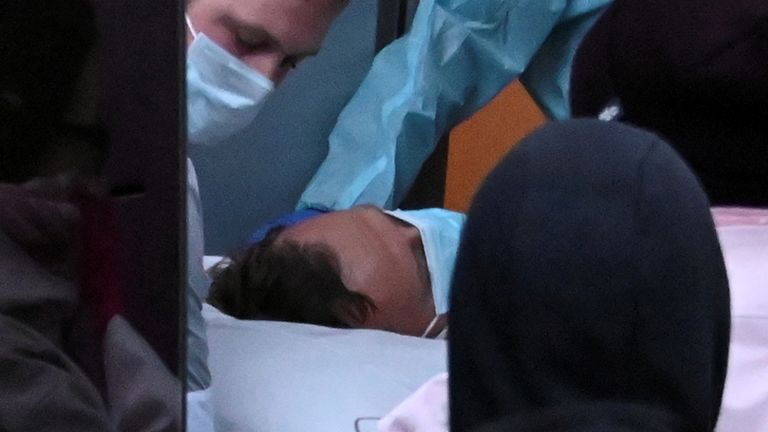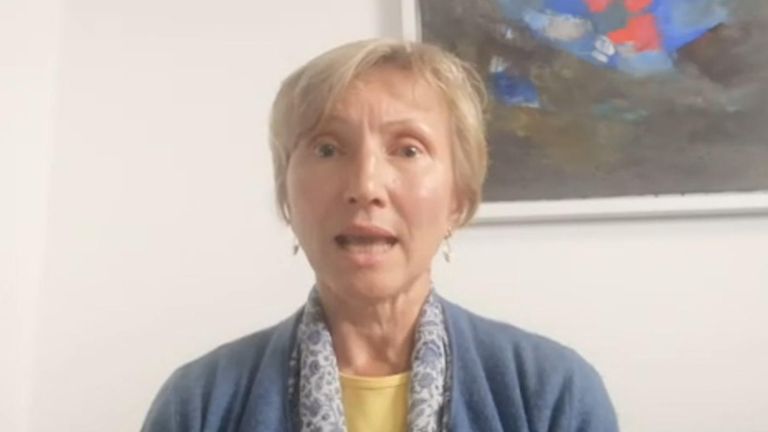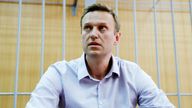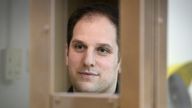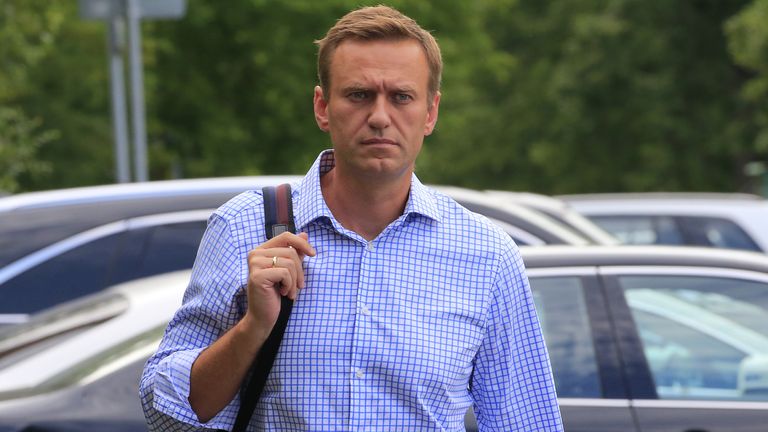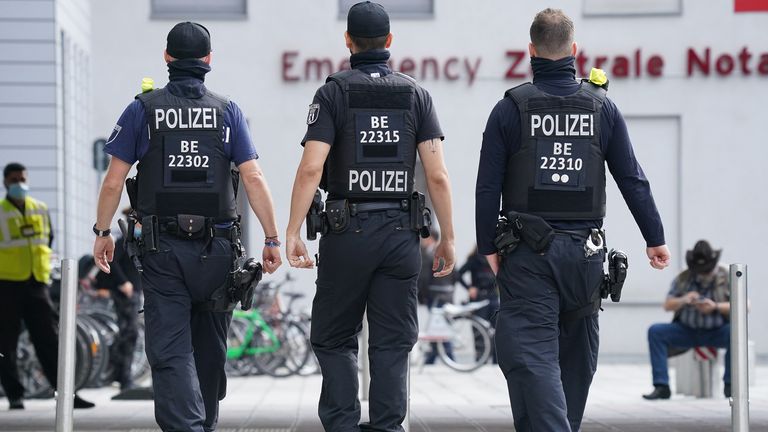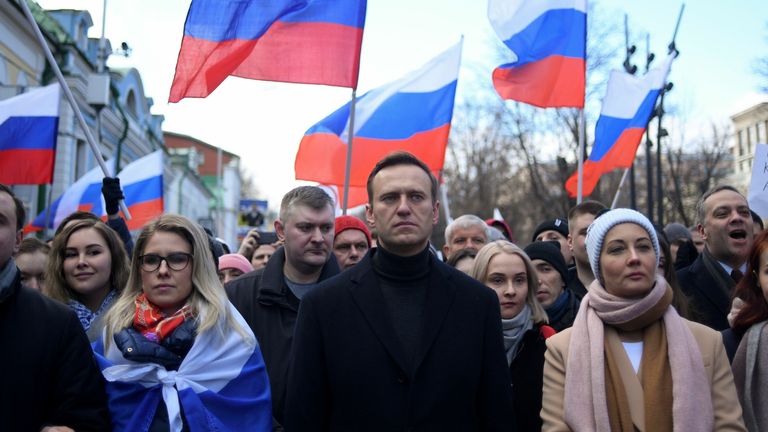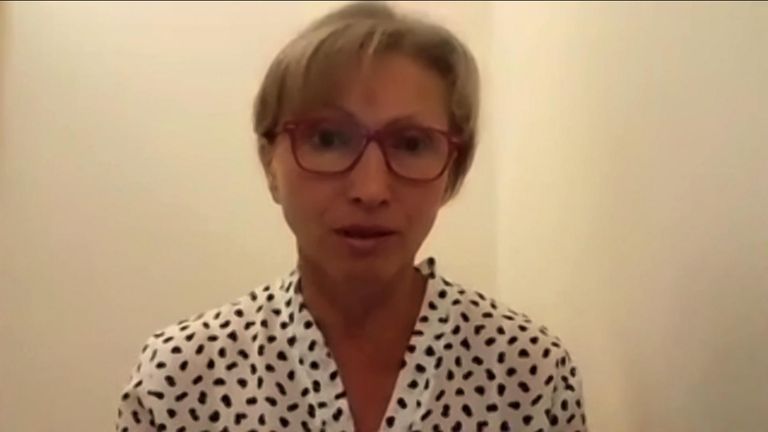Novichok: Nerve agent used on Skripals poisons Putin critic Alexei Navalny, hospital tests find
Former Russian spy Sergei Skripal and his daughter were also poisoned with novichok in Salisbury in 2018.
Thursday 3 September 2020 10:55, UK
Hospital tests have shown Putin critic Alexei Navalny was "without doubt" poisoned with nerve agent novichok, the German government has said.
Tests performed on samples taken from the Russian opposition leader from his hospital bed in Berlin showed the presence of the Soviet-era agent, German Chancellor Angela Merkel's spokesman Steffen Seibert said.
Testing by a special German military laboratory showed proof of "a chemical nerve agent from the novichok group", he added.
Novichok was used to poison former Russian spy Sergei Skripal and his daughter in Salisbury, Wiltshire, in 2018 and is one of the most deadly nerve agents ever created.
Mrs Merkel said the use of novichok showed the "dangerous" attack on Mr Navalny was attempted murder and the aim was to silence him.
She said she has contacted the Organisation for the Prohibition of Chemical Weapons - and expects Russia to carry out an investigation into who was responsible as there are "very serious questions that only the Russian government can answer and must answer".
The Kremlin said it is currently unable to give a proper response to the findings, as its ambassador in Germany was summoned.
Mr Navalny's supporters released videos of the Putin critic carrying out an investigation into corruption in Russia ahead of the poisoning and said they believe this is why he was targeted.
The 44-year-old was taken ill on a flight back to Moscow from Siberia on 20 August and was taken to a hospital in the Siberian city of Omsk after the plane made an emergency landing.
After much opposition from the Kremlin and doctors in Omsk, Mr Navalny was eventually flown to Germany on a medical plane to Berlin's Charite hospital, where doctors last week said there were indications he had been poisoned - something Russian doctors denied.
Mr Seibert said the German government will inform its partners in the European Union and NATO about the test results and will consult with them "on an appropriate joint response" after Russia responds to the results.
Russian state news agency Interfax said medics in Omsk diagnosed Mr Navalny with carbohydrate metabolism disorder and pancreatitis, and the Kremlin is now awaiting Berlin's reply to a request for legal assistance.
A source with details of a Russian inquiry into Mr Navalny's hospital admission said the inquiry is "a purely procedural formality and there are still no reasons whatsoever to assume that Navalny was poisoned".
A Kremlin spokesman said Russia wants a full exchange of data between Moscow and Berlin, as well as full co-operation.
A statement from Berlin's Charite Hospital, which is treating Mr Navalny, said he remains in a serious condition in intensive care and his breathing is being supported by a machine.
It added that he is expected to suffer a long period of illness.
There are more than 100 formulations in the novichok family, all developed by the Soviet Union in the 1970s and 1980s.
Novichok agents are dispersed as an ultra-fine powder rather than a gas or vapour and can be inhaled, ingested or absorbed through the skin.
They are "highly illegal, extremely powerful" and are created to avoid detection, biological and chemical specialist Andy Oppenheimer told Sky News.
Significantly, several of the novichok chemicals are so-called binary weapons - with two less-toxic precursor chemicals that can be mixed prior to use.
This makes them safer to transport and handle.
:: Listen to Polonium and the Piano Player on Apple Podcasts, Spotify, Google Podcasts, Spreaker
One of these is novichok-5, derived from the highly potent A-230 chemical. Its precursor chemicals are ordinary organophosphate pesticides and can be legally made at agricultural chemical manufacturers.
According to Dr Vil Mirzayanov, who worked on the novichok programme in the Soviet Union until he fled to the US, the legitimate use of precursor chemicals was deliberate as it meant they were not placed on the controlled list of the Chemical Weapons Convention.

